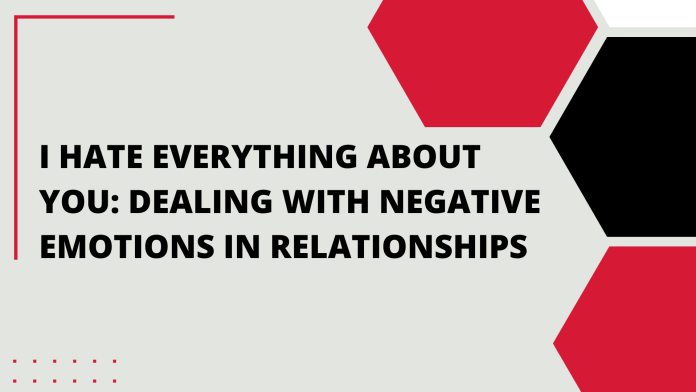Table of Contents
- Introduction
- Understanding Negative Emotions
- The Impact of Negative Feelings in Relationships
- Communication Breakdown
- Self-Reflection and Awareness
- Seeking Professional Help
- Rebuilding Trust and Connection
- Forgiveness and Moving Forward
- The Importance of Self-Care
- Conclusion
- FAQs
Introduction
I Hate Everything About You, In the complex tapestry of human emotions, one of the most profound and challenging experiences is the feeling of hatred towards someone we’re in a relationship with. Whether it’s a romantic partner, a friend, or a family member, the intensity of emotions can be overwhelming. In this article, we will explore the intricacies of dealing with negative emotions in relationships and how to navigate through them.
Understanding Negative Emotions
Negative emotions such as hatred, anger, and resentment are a natural part of the human experience. They often arise from unmet expectations, hurtful actions, or unresolved conflicts. It’s essential to recognize that feeling these emotions does not make you a bad person; it makes you human.
The Impact of Negative Feelings in Relationships
Holding onto intense negative emotions can have a detrimental impact on your relationships. It can lead to a breakdown in communication, further intensifying the negative cycle. Hatred can cloud your judgment and prevent you from seeing the good in the other person.
Communication Breakdown
One of the first casualties of hatred in a relationship is effective communication. When you despise someone, it becomes challenging to express your feelings and needs constructively. This breakdown can lead to misunderstandings and arguments, creating a toxic environment.
Self-Reflection and Awareness
To address and overcome hatred in a relationship, it’s crucial to engage in self-reflection. Ask yourself why you feel this way and what triggered these emotions. Often, digging deep into the root causes can reveal unresolved issues or personal insecurities.
Seeking Professional Help
Sometimes, the hatred in a relationship runs so deep that it requires professional intervention. Therapists and counselors are trained to help individuals and couples navigate through complex emotions. Seeking their guidance can be a transformative step towards healing.
Rebuilding Trust and Connection
Rebuilding trust and connection after experiencing hatred is a gradual process. It requires open and honest communication, a willingness to forgive, and a commitment to change. Both parties must be actively involved in this process.
Forgiveness and Moving Forward
Forgiveness is a powerful tool in releasing the grip of hatred. It doesn’t mean condoning hurtful actions but choosing to let go of the negative emotions that bind you. Forgiving someone can be liberating and can pave the way for reconciliation.
The Importance of Self-Care
During the journey of dealing with hatred, it’s essential not to neglect self-care. Engage in activities that bring you joy and relaxation. Surround yourself with a support system of friends and loved ones who can provide emotional support.
Conclusion
In conclusion, hatred in a relationship is a challenging emotion to grapple with, but it is not insurmountable. By understanding its roots, seeking help when necessary, and embracing forgiveness and self-care, you can begin the journey towards healing and rebuilding the connection with the person you once cared about.
FAQs
1. Can hatred in a relationship ever be completely eradicated? Hatred can be transformed and lessened with time and effort, but complete eradication may not always be possible.
2. How do I know when it’s time to seek professional help for my relationship issues? Seek professional help when your negative emotions are causing significant distress and are affecting your well-being and the relationship itself.
3. Is forgiveness always necessary for healing in a relationship? Forgiveness can be a powerful tool, but it’s not the only path to healing. It depends on the individuals involved and their unique circumstances.
4. Can self-care really make a difference in how I feel about someone I hate? Yes, self-care can significantly impact your emotional well-being and your ability to navigate complex emotions.
5. Are there support groups for people dealing with intense negative emotions in relationships? Yes, there are support groups and online communities where individuals share their experiences and seek guidance from others in similar situations.
In the depths of negative emotions, there is still hope for resolution and healing. Remember that every relationship is unique, and the journey to overcoming hatred may vary. With patience, understanding, and a commitment to change, it’s possible to transform “I hate everything about you” into “I understand, and we can work through this.”

